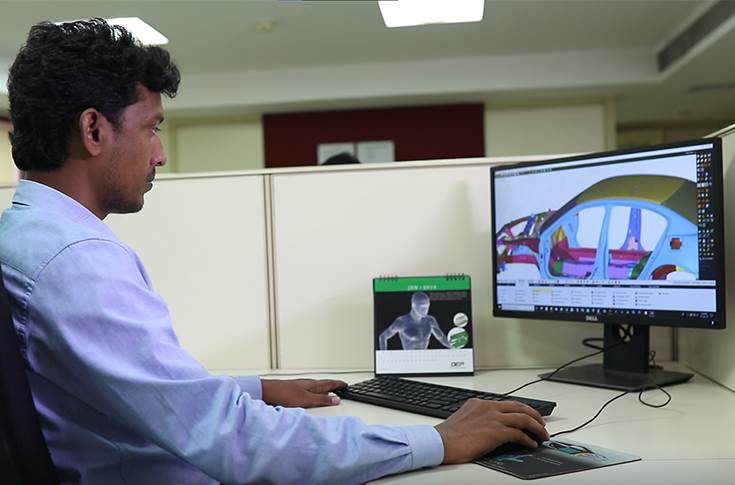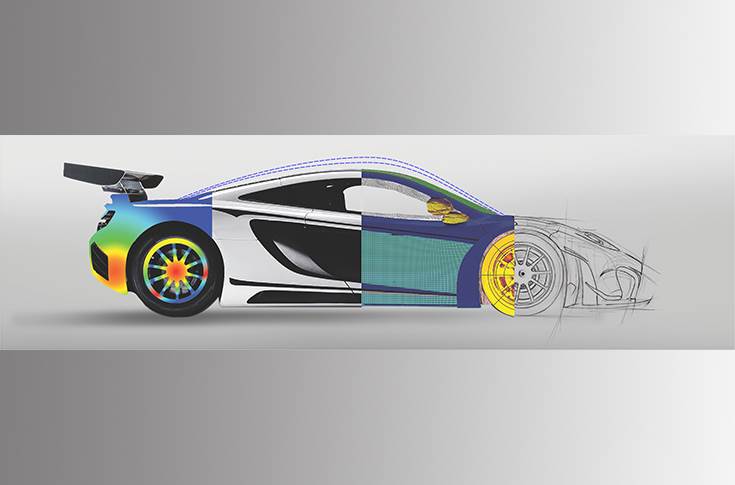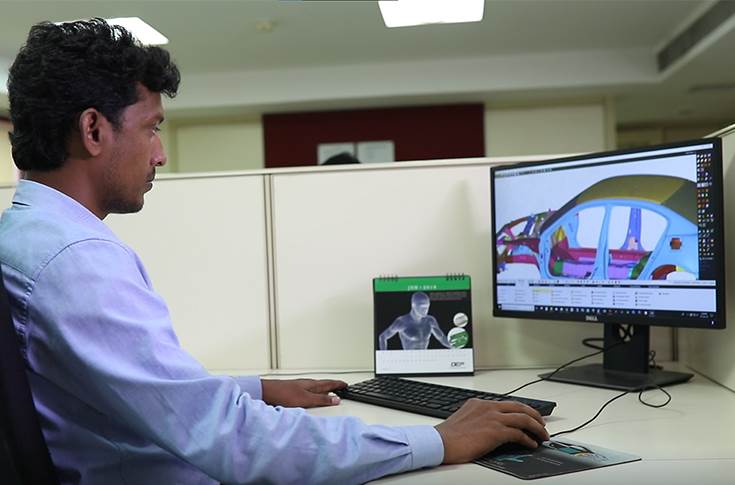With its Computer-Aided Design and Engineering solutions, Detroit Engineered Products (DEP) is enabling the automotive industry’s accelerated shift towards sustainable and futuristic technologies, including electric vehicles. From being incepted in 1998 in Troy, Michigan, USA, DEP is now a global company with footprints in Europe, China, Korea, Japan, and India, and is empowering automotive companies to get faster to the market, while reducing their costs, mitigating risks, and therefore, providing them with a competitive advantage.
Excerpts from the interview:
What are the key attributes of DEP’s tools such as MeshWorks that enable product design and development in the automotive industry?
DEP MeshWorks 2023 is a robust Computer-Aided Engineering (CAE) platform poised to revolutionize product development in the automotive industry. It has a fully-equipped suite of CAE modules with cutting-edge toolsets tailored for forward-looking engineering needs, including support for EV and ADAS application development, as well as harnessing backend technologies like AI/ML algorithms to expedite market entry strategies.
With built-in modules for extremely fast concept CAE and CAD model generation, advanced meshing, and morphing capabilities, streamlined process automation, and cutting-edge concept modelling, engineers can achieve exceptional outcomes in record time.
What is the importance of CAD and CAE in the modern day when there is cut-throat market competition and high stakes at risk?
In today’s hyper-competitive business landscape, the significance of Computer-Aided Design (CAD) and Computer-Aided Engineering (CAE) cannot be overstated. While CAD expedites the design process, allowing for rapid prototyping and iteration, enabling companies to bring products to market faster than competitors, CAE, on the other hand, ensures the robustness and reliability of designs through simulation and analysis, reducing the likelihood of costly product failures and recalls.
 These tools collectively enhance efficiency, reduce costs, and mitigate risks, providing a crucial competitive advantage that is essential for survival and success in industries where market competition is cutthroat and the consequences of failure are severe.
These tools collectively enhance efficiency, reduce costs, and mitigate risks, providing a crucial competitive advantage that is essential for survival and success in industries where market competition is cutthroat and the consequences of failure are severe.
How are DEP solutions enabling the shift towards sustainable mobility solutions such as EVs?
DEP offers a comprehensive suite of services and software tools designed to support the development of electric vehicles (EVs). We are a one-stop-shop for EV solutions in the product development space, and we work with clients providing solutions like competitive benchmarking, reverse engineering, CAD, CS, CAE, light-weighting, prototyping, and more.
Collaborating closely with OEMs, we aid in the creation of new EV variants and prototypes. Leveraging our extensive experience, we deliver precise and expedited validation on a large scale. Our team of experienced professionals and our proprietary MeshWorks platform facilitate end-to-end solutions for the entire product lifecycle, encompassing benchmarking, conceptual design, simulation, optimisation, prototyping, and testing for EVs, hybrid EVs, and battery EVs.
How is the industry leveraging these tools to develop new powertrain, transmission, and full-vehicle systems?
The automotive industry is harnessing the power CAE tools to spearhead innovations in the development of powertrain, transmission, and full-vehicle systems. CAE offers a virtual playground where engineers can design, simulate, and refine these critical components with unparalleled precision and efficiency. Through intricate modelling and simulation, CAE allows for the optimisation of powertrain configurations, ensuring optimal performance, fuel efficiency, and emissions compliance.
 In transmission systems, CAE aids in the design of gears, clutches, and torque converters, optimizing their functionality and durability. Moreover, CAE plays a pivotal role in full-vehicle systems, enabling engineers to assess safety through crash simulations, evaluate structural integrity, and refine aerodynamics. These tools significantly reduce the need for physical prototypes, accelerate development timelines, and ultimately contribute to the creation of safer, more efficient, and technologically advanced vehicles in today’s rapidly evolving automotive landscape.
In transmission systems, CAE aids in the design of gears, clutches, and torque converters, optimizing their functionality and durability. Moreover, CAE plays a pivotal role in full-vehicle systems, enabling engineers to assess safety through crash simulations, evaluate structural integrity, and refine aerodynamics. These tools significantly reduce the need for physical prototypes, accelerate development timelines, and ultimately contribute to the creation of safer, more efficient, and technologically advanced vehicles in today’s rapidly evolving automotive landscape.
Which are DEP’s key automotive clients in India and overseas markets? What are DEP’s global expansion plans?
We have worked with nearly all renowned automotive OEMs and Tier 1 suppliers globally and our approach strategically focuses on cultivating a global network of partners, enabling us to access markets directly and indirectly. This collaborative strategy has played a pivotal role in our continued expansion, which is progressing steadily. In tandem with our partners, our growth has deepened our presence within the automotive industry while also broadening our horizons into other sectors like aerospace. We remain committed to expanding our partner network each year as part of our ongoing growth strategy.
What role does India play in the creation of the core DEP products for the automotive industry? With its strong engineering talent, does the company look at making India a global technology hub?
India is an integral component of the global automotive ecosystem, playing a pivotal role for DEP due to its rich reservoir of engineering expertise. We are proud that our CAE platform DEP MeshWorks, is proudly conceived and developed right here in India. With its burgeoning technology landscape and abundant engineering talent, India possesses immense potential to transform into a worldwide technology nucleus for the automotive sector. This potential extends to the creation of innovative solutions and the advancement of electric vehicles, autonomous driving, and intelligent mobility systems. Corporations are increasingly acknowledging India’s strategic significance in shaping the future of automotive technology and are poised to continue channelling investments into its emergence as a global technology hub. At DEP, we are no exception to this trend.
How does the company ensure training of industry/academia personnel using its tools and solutions?
The DEP team aids engineers and users in their ongoing learning and professional development through a variety of initiatives. We frequently offer inclusive training programs, workshops, and webinars that delve into different aspects of the software’s capabilities and recommended approaches. Our resources include comprehensive documentation, tutorials, and user forums, providing users with the opportunity to independently explore and learn. We also provide consistent software updates and responsive customer support to ensure engineers remain current with the latest features and promptly address any technical issues. By promoting a culture of perpetual learning, DEP empowers engineers to optimise their proficiency in utilizing DEP MeshWorks and to advance in their professional journey.
 Does DEP foresee demand for cloud-based solutions in the future? What is the company’s technology roadmap?
Does DEP foresee demand for cloud-based solutions in the future? What is the company’s technology roadmap?
Certainly, the future promises an escalating demand for cloud-based solutions. The evolving landscape of technology and business practices is driving this shift. Cloud solutions offer unparalleled advantages, including scalability, cost-effectiveness, and accessibility, making them indispensable in an increasingly digitised world. The Covid-19 pandemic accelerated the adoption of remote work and digital transformation, reinforcing the importance of cloud-based tools and services. As industries embrace IoT, big data, and AI, the need for flexible, remote, and data-driven solutions will only intensify, solidifying the position of cloud computing as a fundamental pillar of DEP’s digital future. We are integrating several of these technologies into our CAE platform, DEP MeshWorks already, and with every new release it only becomes more robust, intuitive and powerful.
How has DEPs performance been in CY2023? What growth potential do you anticipate in the coming years?
We have been steadily growing, and with the pandemic behind us, we are glad that 2023 has so far been a good year for us. Over the past 18 months, we have successfully inaugurated two new offices, one in China and our fourth office in India, specifically in Tamil Nadu. Furthermore, during this time frame, we have welcomed four additional partners into our global network, enhancing the reach of our services. We anticipate sustaining this momentum and are currently positioned to embark on an expansion journey into European markets, which will be announced in 2025.
